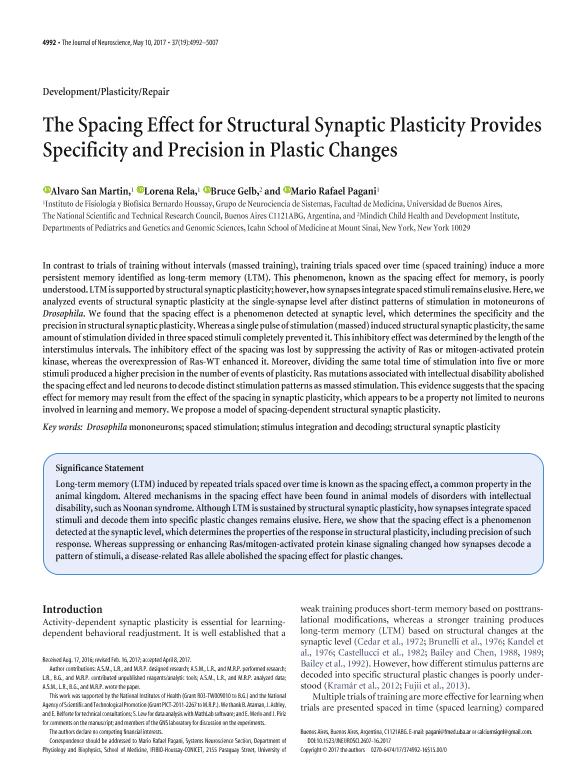Artículo
The Spacing Effect for Structural Synaptic Plasticity Provides Specificity and Precision in Plastic Changes
Fecha de publicación:
05/2017
Editorial:
Society for Neuroscience
Revista:
Journal of Neuroscience
ISSN:
0270-6474
Idioma:
Inglés
Tipo de recurso:
Artículo publicado
Clasificación temática:
Resumen
In contrast to trials of training without intervals (massed training), training trials spaced over time (spaced training) induce a more persistent memory identified as long-term memory (LTM). This phenomenon, known as the spacing effect for memory, is poorly understood. LTM is supported by structural synaptic plasticity; however, how synapses integrate spaced stimuli remains elusive. Here, we analyzed events of structural synaptic plasticity at the single-synapse level after distinct patterns of stimulation in motoneurons of Drosophila. We found that the spacing effect is a phenomenon detected at synaptic level, which determines the specificity and the precision in structural synaptic plasticity. Whereas a single pulse of stimulation (massed) induced structural synaptic plasticity, the same amount of stimulation divided in three spaced stimuli completely prevented it. This inhibitory effect was determined by the length of the interstimulus intervals. The inhibitory effect of the spacing was lost by suppressing the activity of Ras or mitogen-activated protein kinase, whereas the overexpression of Ras-WT enhanced it. Moreover, dividing the same total time of stimulation into five or more stimuli produced a higher precision in the number of events of plasticity. Ras mutations associated with intellectual disability abolished the spacing effect and led neurons to decode distinct stimulation patterns as massed stimulation. This evidence suggests that the spacing effect for memory may result from the effect of the spacing in synaptic plasticity, which appears to be a property not limited to neurons involved in learning and memory. We propose a model of spacing-dependent structural synaptic plasticity.
Archivos asociados
Licencia
Identificadores
Colecciones
Articulos(IFIBIO HOUSSAY)
Articulos de INSTITUTO DE FISIOLOGIA Y BIOFISICA BERNARDO HOUSSAY
Articulos de INSTITUTO DE FISIOLOGIA Y BIOFISICA BERNARDO HOUSSAY
Citación
San Martín, Alvaro; Rela, Lorena; Gelb, Bruce; Pagani, Mario Rafael; The Spacing Effect for Structural Synaptic Plasticity Provides Specificity and Precision in Plastic Changes; Society for Neuroscience; Journal of Neuroscience; 37; 19; 5-2017; 4992-5007
Compartir
Altmétricas




